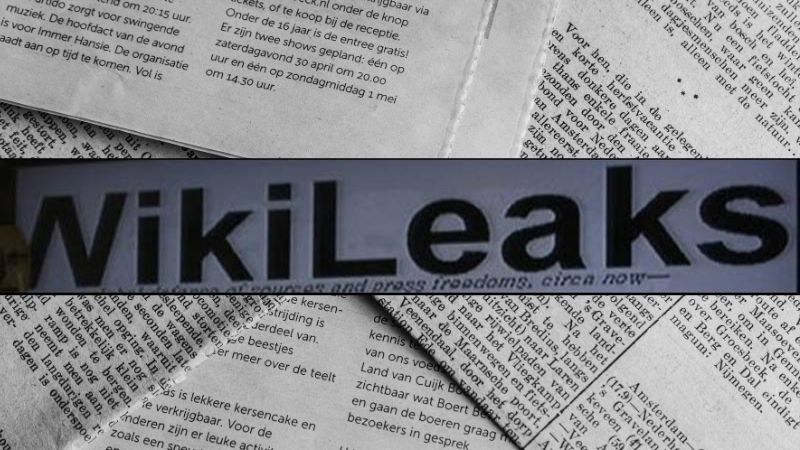An extraordinary exposé through WikiLeaks has shaken the closed doors diplomacy and the global security establishment, which flourishes on a culture of secrecy. The powerful lobbies have reacted first by an extraordinary vilification of Assange, reopening of old cases (not unlike what third world politicos ‘fix’ to their rivals) and later by arresting and trying him. Multiple battles are central to WikiLeaks’ saga: first, the right to information; second, how warped the US foreign policy process is; and third how puerile and myopic national establishments are when dealing with issues at home and abroad.
Perhaps, the real spotlight has been on the neoimperial construct – the AfPak region where a failed US strategy and a horrific occupation has reinvented a Taliban resistance movement. The allegations that Pakistan has helped abet this Pashtun resistance in Afghanistan only gets regurgitated through the confidential cables of ‘informed’ diplomats. While the world has gloated over the leaked cables, little attention has been paid to the fact that these cables are the views of US embassy staff based on their local informants.
Within Pakistan, the cables created a storm as the military and civil leadership was exposed on their proclivity to consult and inform the US Ambassador on almost all vital affairs of domestic and foreign policy. This time the military leaders were also indulging in the game thereby shedding the myth that the post-Musharraf Army in Pakistan had distanced itself from politics. The extraordinary role of Saudia Arabia and other Gulf states in Pakistan’s politics was also revealed through these cables. The Saudi King does not like Zardari and would rather see a military regime. And, the diplomats in the Holy kingdom were recording how financing of militant groups was being undertaken from Saudi Arabia.
Pakistan’s dysfunctional state of being was well exposed. The US Ambassador moved across the country and its power-wielders with relative ease. Surprisingly, Ambassador Patterson also emerged as an Agony Aunt of sorts where many of her official contacts were unloading their angst and dilemmas duly recorded in the faithful cables sent to Washington.
Contents of these cables and the positions reconfirmed what were widely held and believed in Pakistan and outside. However, the WikiLeaks endeavour provided credence to these strands of conventional wisdom. Similarly, the manner in which the disastrous Afghanistan war project has foundered also magnified the pitfalls of US policy and strategy for the region. Ten years down the line, the US and its NATO allies are bogged down under their own weight and grappling with a region which they understand little, partially unaware of its history. Yet, the recognition of Pakistan’s central role in a post-NATO Afghanistan and its India obsession came into light.
Perhaps the most significant confirmation has been the India-centric view from Islamabad. Now the Pakistanis know it all too well. But it is for the world, especially the US, to take note of it and before the grandiose Af-Pak plans it needs to get these two countries on a dialogue table. Shameful as it might be, the two establishments need to be prodded to do what would be a civilized way of co-existing by keeping the diplomatic channels open. However, the terrorism card that India flashes every now and then against Pakistan is not always tenable or desirable. After all, the WikiLeaks also tells us that the powerful and US-friendly leader Rahul Gandhi of the Indian National Congress cites the problem of Hindu terrorism as an equal if not a greater challenge to Indian society.
In wake of these revelations, Pakistan’s invisible power centres retorted in clearly an unthinking manner. A shady newspaper published doctored leaks about Indian meddling in Pakistan’s troubled province of Balochistan. Even more unthinking mainstream media editors picked up these stories and published on their front pages and flashed them on TV screens to fan the anti-India sentiment. Once discovered that these stories were fake and downright lies, all newspapers apologized and the Islamabad based news agency which released the concocted cables fired its editor for causing the rumpus. The damage was done and this time sections of Pakistan media also exposed their incompetence as well as unhealthy proximity with doubtful conspiracy theory factories.
Most recently, cables on India have laid bare its human rights in Kashmir where torture and inhuman treatment of detainees was reported by none other than the International Red Cross after its 177 field visits between 2002-04. The diplomatic cables released show how the world’s largest democracy India ‘condoned’ the use of torture. A cable from 2005, in which Red Cross briefs an American diplomat, reports on the frustration of ICRC with the Government of India on the issue of torture. “The continued ill-treatment of detainees, despite longstanding ICRC-GOI [Government of India] dialogue, have led the ICRC to conclude that New Delhi condones torture”, the cable indicated.
Some analysts have noted that the lack of cooperation on the part of GOI forced the ICRC to give this secret briefing to American diplomats in 2005. The cable also noted that Indian Ministries of External Affairs and Home Affairs “protests ICRC presence and activities in J&K, and keeps the organization in legal limbo, but allows their operations to continue.”
The Indian response has been a familiar South Asian story: “In India, there is a healthy tradition of democratic debate and freedom of expression on all issues that concern the welfare of our citizens anywhere in our country. Neither have we shied away from an open and candid discussion on such issues when raised by our international friends and partners.” This worn out cliche does not explain the serious torture allegations in Kashmir. Kashmir somehow remains in the limelight. Brave Indian writers such as Arundhati Roy (now facing a sedition case) have time and again reported on how ordinary Kashmiris have suffered at the hands of Indian military and militants alike. ICRC noted that the torture has been directed at ordinary civilians, while militants have been killed mostly in shoot-outs. Hardly the way a political issue should be treated.
Interestingly, these revelations have come at a juncture when few days earlier selected outlets of Pakistani media ran fake stories of Wikileaks alleging brutal tendencies amongst Indian army officials. Strikingly, the cables also show that not all Indian aid to Afghanistan is humanitarian. Truth is so muddled and grey we always knew. But it is always good to get a reaffirmation from the formal communiques.
Another cable tells us that Rahul Gandhi, the ‘crown prince’ of India’s largest national party remarked to the US ambassador that he considered that the threat of Hindu extremists was graver in nature than that of Jihadists. Gandhi confided in the diplomat “the risk of a ‘homegrown’ extremist front, reacting to terror attacks coming from Pakistan or from Islamist groups in India, was a growing concern and one that demanded constant attention.” Indian opposition has created a furore over this statement for it somehow (the logic is completely flawed) favours Pakistan. It is however good to see that people who matter within India are not as biased and sensationalist about Islamic terror as the media in general happens to be.
However, the larger question as one Indian commentator mentioned why do Indian politicians have to be so close to the US? The Pakistani elites have a penchant for toeing the US line but the Indian counterparts have no such compulsion, the commentator quipped. This is the sad reality of Southasian elites: the blanket espousal of neoliberal policies and finding salvation in globalism and consumerism makes them identify with the US power and its hegemony. Pakistan wants more rents from the US and treats it as a power broker, the Indian establishment follows the US anti-terror mantra blindly and is scrambling for global power in a region where China is a greater bidder. All these power narratives cannot hide the disempowerment and exclusion of millions who continue to locate their lives in this mess.
But the leaks are whopping in number and deal with the world. Their release is a milestone in terms of citizen access to information. A beleaguered US establishment wants to trump up espionage charge and other inward-looking nation states are trying to counter and rectify the damage in their own particular ways. The global corporate media is now attempting to downplay the damage and also a participant in suppressing some of the information. Indeed, the utter lack of ethics – ’embedded’ journalism of the Western variety, the lobbying media sections in India and security-savvy Pakistani oracles – has also been threatened by the sheer scale of this expose. The manufacturers of consent and masters of ‘dumbing down’ are therefore smelling the coffee and indulging an unprecedented campaign of belittling Assange’s motives, credentials and character.
The cat however is out of the bag and secrecy will have to be redefined and renegotiated by power-lobbies.Global citizenry will have to be prepared for another round of struggle for information and transparency. In South Asia, this is also a challenge for those media persons work on the periphery of big business and establishment. The growing power of new media and social networking will have to be contended with. After all, how many sites and tweets will be censored? The explosion of social media therefore sets the future directions for a new battle between those who use secrecy and media manipulation and those who want to work around facts, unembellished by agendas.
Raza Rumi is a writer, policy adviser and editor based in Lahore, Pakistan. He blogs at www.razarumi.com . Email: razarumi@gmail.com



